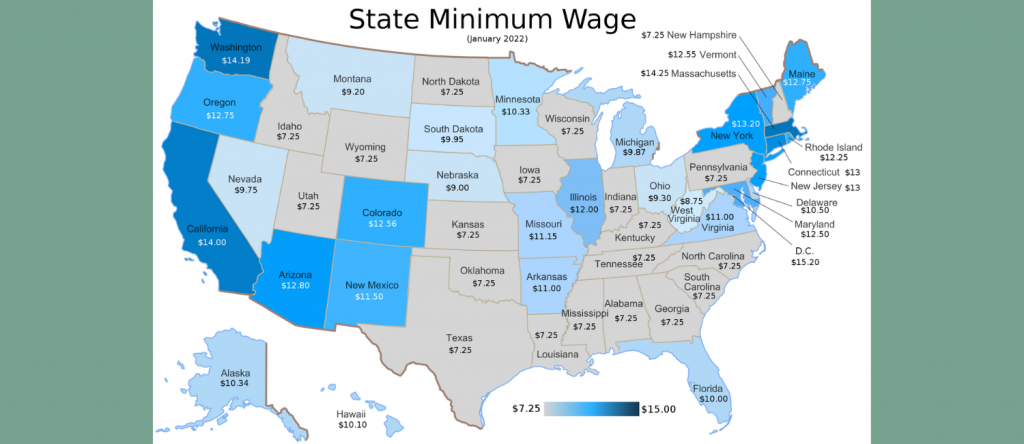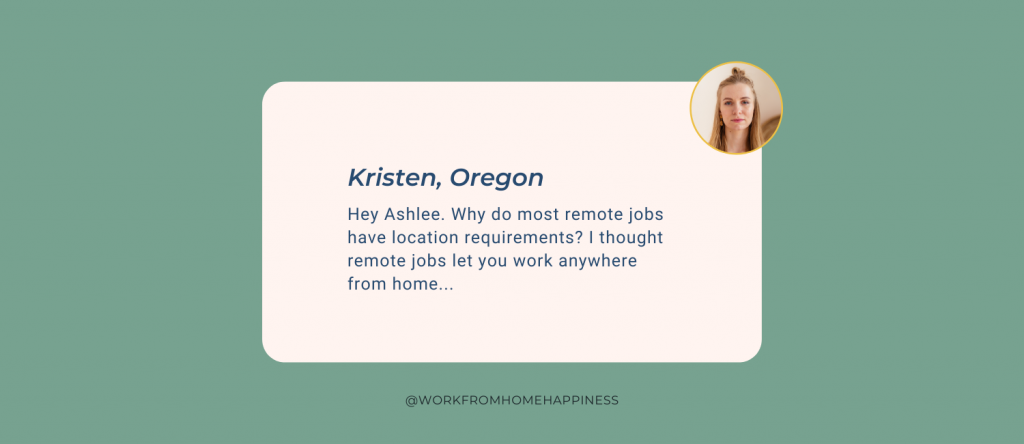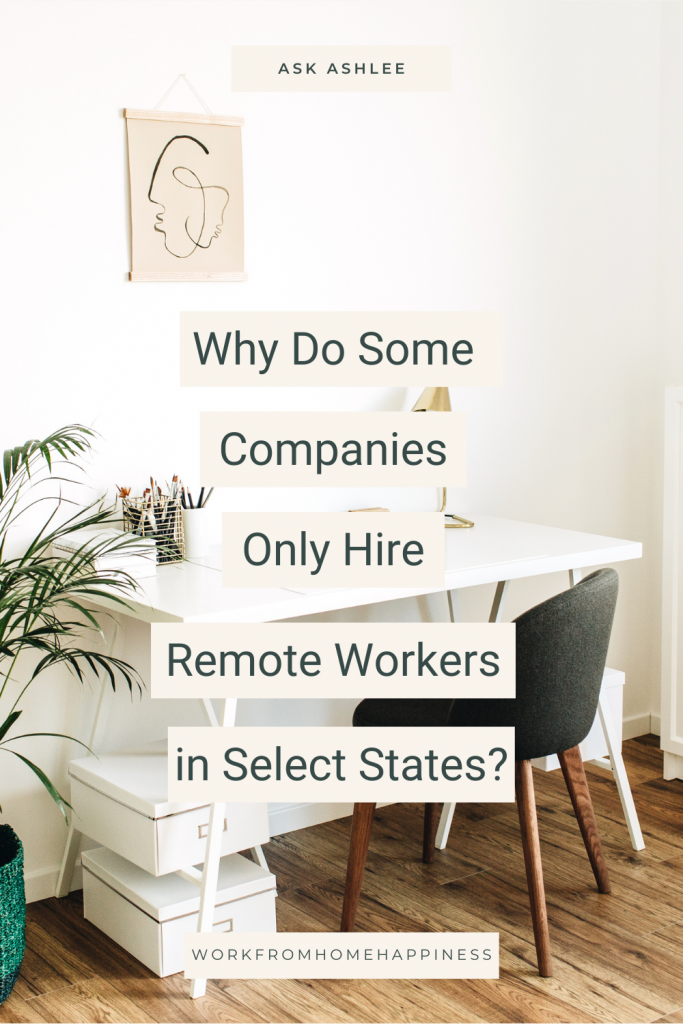I am often asked, “Why doesn’t Company XYZ hire remote workers in my state?” In fact, this question comes up so often that its answer deserves a dedicated blog post.
And, I get it. Remote job searches (like all job searches) are draining. It’s incredibly frustrating to find the *perfect* remote job only to realize the company doesn’t hire in your state. Cue sad trombone noises…
Fortunately, you quickly brush off this setback only to find even more remote jobs that exclude your state. What gives?
Doesn’t “work from home” mean just that whether your home is in Iowa, Florida, or California?
Unfortunately, it’s not that simple. In fact, just 5% of remote jobs posted on FlexJobs have no location restrictions.
Clearly, these location requirements are there for a reason, and that reason isn’t just a dislike for your state and the people within it. Instead, the answer boils down to money and state laws.
State Registration Requirements
First, a company must register its business in each state to legally hire there. With 50 US states (plus D.C., Puerto Rico, and other territories) registering is time consuming, complicated, and expensive.
Registration Rules
For example, Arizona asks companies to provide certified copies of its articles of incorporation and a certificate of good standing. Both documents must be dated within 60 days. Plus, there’s a filing fee as high as $365 (not to mention obtaining certified copies of business documents costs money too). It all adds up quickly.
In-State Address
Additionally, most states require a local physical address (not a P.O. box) for out-of-state companies. To comply, companies hire registered agents in each state to receive mail, subpoenas, tax notices, and other important documents from state agencies.
That’s a lot of moving parts for a single company to handle. Some states make it a bigger hassle to hire locally. Often, remote-friendly companies opt out of registering to hire in those states.
State Taxes
Next up, a company opens itself up to tax implications with each new state they hire in. For starters, employers need to register with the correct state agencies and follow state-specific tax rates. As you know, taxes are never fun to deal with. This holds true for companies, too!
Tax ID
A state-provided tax ID is needed in addition to a federal tax ID or employer identification number (EIN). Why? A state ID is used by companies to legally take money from paychecks to pay state taxes (called withholding).
The amount and type of withholdings varies by state.
Some states don’t withhold income taxes at all. Others require companies to tax employees based on the employee’s location and not the company’s home state. There are select states that require companies to pay both local AND home state taxes.
For example, if a company headquartered in California hires you remotely in North Carolina they have to pay California and North Carolina state taxes.
Of course, companies prefer to hire in states with favorable tax rules.
Hiring Laws, Rules, and Regulations
Even after a company files to hire and set up taxes, there are more rules to follow during the hiring process.
First, the content of applications has to comply with state-level laws.
Non-discrimination and Equal Employment Opportunity
Each state has rules banning employment discrimination based on marital status, sexual identity, and gender identity/expression. Plus, some states offer additional protection for whistle-blowers. There are even state specific laws that regulate an employer’s rules about off-duty conduct (smoking, posting on social media, etc.).
Criminal History
At some point, you’ve likely filled out an application that asked whether you’ve been convicted of a crime. Today, some states have regulations that prevent employers from asking about criminal history during the application process. However, this rule doesn’t apply once a conditional job offer is given.
Background Checks, Drug Testing, and References
Many companies require background and reference checks for potential employees. Of course, every state has unique rules covering when companies can ask for screening, which positions need to be drug tested, and who will pay for the background check and/or drug testing. There are also rules regarding running credit checks on applicants.
Also, there is a long list of employment regulations each state has regarding topics like:
- Child labor
- Immigration
- Interview questions
- Lie detectors
- Public records
Some states have many rules to follow throughout the hiring process. Others take a more relaxed approach. Either way, companies will consider each state’s regulations and employment laws before they decide to hire there. Highly restrictive states often get passed over for those that are more employer-friendly.
Payroll
Last but certainly not least, states have payroll rules in place (try saying that five times real fast) that companies have to follow. Payroll, of course, is the important process of paying workers. Understandably, there are plenty of statewide payroll restrictions to protect workers’ paychecks.
Minimum Wage
Minimum wage in the US is a hot topic. Currently, the federal minimum wage is a measly $7.25/hour. This rate hasn’t increased since 2009!
In response, many states have their own minimum wage – some higher and some lower than the federal standard.

For example, Wyoming & Georgia have rates at just $5.15 an hour. However, many states have higher minimum wage rates (as of 01/01/2022) including:
- Florida: $10.00
- California: $14.00
- Washington: $14.49
- Arizona: $12.80
- New Jersey: $13.00
- New York: $13.20
Remember, companies have to follow the state rules where its employees live.
For example, a company located in Wyoming must pay remote employees living in Washington $14.49/hour – a whopping $9.34 lower than Wyoming’s minimum wage.
Unfortunately, restricting hiring in states with higher minimum wages saves companies plenty on payroll. You might see fewer remote jobs if you live in a state with better than average minimum wage.
Paycheck Frequency
Most companies choose to pay workers weekly, biweekly, or semimonthly. However, when hiring out-of-state, companies must meet that state’s guidelines.
For example, Florida doesn’t have pay frequency rules. However, a Florida company that hires in New York must pay remote New Yorkers weekly to comply with state law.
And, running payroll isn’t exactly cheap. According to Cost Owl, companies pay about $5 per employee for each pay cycle. Of course, more pay cycles = more money.
Companies looking to save cash might forgo hiring in states requiring weekly pay. Check out your state’s payday requirements to see how it stacks up against others.
Overtime
Overtime compensates employees at a higher pay rate when they work longer hours. Per Federal rules, overtime pay of time and half is given to employees who work more than 40 hours in a week.
For example, an employee who earns $20/hour will be paid $30/hour for any overtime worked.
- Half of $20 = $10
- Time ($20) + Half ($10) = $30
Some states are more generous with overtime than Federal Laws. Alaska, California, and Nevada require overtime pay whenever an employee works more than 8 hours in a day.
In these states, remote companies default to the rule that is most favorable to workers.
Additional Payroll Rules
Pay is important to the workforce. It makes sense that states have strict rules to protect their workers.
Honestly, I could write ten blog posts on payroll restrictions by state. But, that would be incredibly boring for most to read.
Instead, I’ve condensed major payroll rules down to a readable list. Below are state payroll rules that complicate hiring for remote companies.
- Fair scheduling with predictable schedules and adequate time between shifts
- Check deductions for uniforms, office equipment, and drug tests
- Meal time and breaks for eating/resting/nursing during work hours.
- Final pay determining how quickly a company must pay and whether it includes unused vacation days
- Sick days to pay employees when illness prevents working
Of course, companies are in business to make money. Part of that includes saving money whenever possible. States with high minimum wage, strict tax laws, and frequent pay cycles are less attractive to employers. As a result, its often easier (and more affordable) to skip over these states.
How to Find Remote Jobs in Your State
By now, you’ve learned way more than you wanted to about remote hiring rules. Hopefully, your excess knowledge explains why companies might not hire remote workers in your state.
Ideally, remote-friendly companies open up virtual doors to all applicants regardless of location. However, this isn’t the current state (no pun intended) of remote work in the US.
Does that mean you’re out of luck if your state is often excluded from remote jobs? Of course not. You just need to fine tune your job search.
Look Into Startups
First, consider startups. Typically, a startup is a young company (less than 5 years old) that was founded to disrupt an industry. Airbnb, Angry Birds, Uber, and Instagram are all well-known and extremely successful startups.
These newer companies want to hire the best talent to help fuel growth. To do this, startups often hire remote workers from around the world. Global hiring provides access to a much larger talent pool.
In fact, many startups build remote work right into their company culture. It’s really a win-win: The startup has tons of options to hire and candidates enjoy the perk of working remotely from almost anywhere.
Freelancing
Don’t want to rely on companies to hire in your state? No problem. Freelancing is a good solution. As a freelancer, you sell services to clients. Then, you bill the client for your services.
Popular freelance skills include writing, editing, proofreading, transcription, and virtual assisting. This is a short list. Honestly, if you’re proficient in a computer-based skill you can sell it as a freelance service.
Freelancing is great for digital nomads or anyone who wants the freedom to work where and when they want to. This remote work type is also attractive to parents who need flexibility to work from home with kids.
Self-Employment
Today, it’s easier than ever to start your own online or home-based business (without resorting to MLM or direct sales). In fact, you can get a money-making website up in a matter of days!
Examples include e-commerce, Etsy shop, job board, and blog – to name a few.
Plus, you can even start an online business. For example, bookkeeping, coaching, author, creator/crafter, content marketer, and consultant are businesses easily conducted entirely online.
As a bonus, self employment allows you to work anywhere with an internet connection. After all, you are your own boss!
Resources to Overcome a State Restricted Remote Job Search
Finally, I want to share resources to improve your remote job search – especially if your state is holding you back. The more tools you have in your pocket, the easier your remote job search becomes.
Remote Job Search Sites
Remotive – A go-to site for remote startup jobs with a free webinar and a remote companies list
FlexJobs – A membership site with hand-screened remote jobs and filters you can use to exclude jobs not hiring in your state (Save 30% with FlexJobs Promo Code SAVE30)
Freelance Job Boards
Upwork – Create a profile and pitch your services to gigs posted by clients
Fiverr – Get creative and set up a profile with services laid out for people to buy directly.
Work from Home Staffing Agencies
Kelly – Find freelance, part-time, full time, and temporary remote jobs here.
Kforce – Tons of remote jobs in tech, finance, and accounting. Options include short-term contract, 100% remote, and temporary roles.
Robert Half – A global staffing agency consistently ranked as one of the Top 100 companies with remote work.
Remote Job-Ready Skills Training
Transcribe Anywhere – Free mini course to introduce you to transcription work as a remote worker.
Proofread Anywhere – Free 76-minute webinar for learning about working online as a paid proofreader.
LinkedIn Learning – Quickly learn job skills and share your completed lessons directly on your LinkedIn Profile.
Coursera – Learn in-demand work skills from top universities.
Online Business Building
Wandering Aimfully – An amazing coaching program I used to grow my blog and career coaching business. I highly recommend it if you already have an online business you want to build up intentionally.
Bookkeeper Business Launch – Start (and scale) a bookkeeping business from scratch. Sign up for free training series first!
SmartBlogger – Turn a love of writing into a thriving online content marketing business. Read the free roadmap first!
Edit Republic – My friend, Phon, started and scaled an amazing editing and proofreading business. Now, she teaches others how to do the same.
Location Requirements in Remote Work
You can’t control whether a company hires remote workers from your state. And, that’s okay.
Remember, companies can’t just decide to one day start hiring in a certain state. Instead, they have to go through long and expensive processes just to get set up. After, companies must continue to follow employment laws based on the state each employee works in!
Fortunately, your location doesn’t necessarily need to hold you back in your job search. Consider freelancing or self employment instead. Plus, there’s staffing agencies, startups, and job boards to help you find remote work in your neck of the woods.
Happily,
Ashlee Anderson, CPCC
PS This post contains affiliate links. Please read my disclosure statement for more details.








Leave a Reply